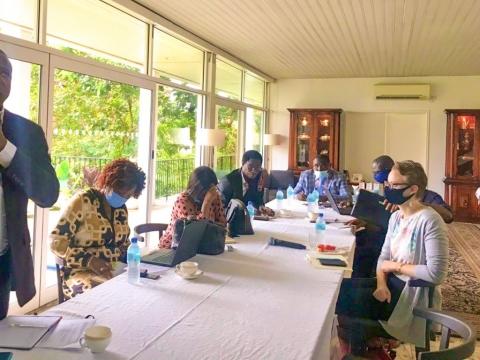The British High Commissioner to Sierra Leone, Simon Mustard, recently held a small socially distanced breakfast to mark the International Day to End Impunity for Crimes against Journalists. The day was commemorated on the 2nd November.
Mr Mustard used the event he hosted at his resident in Freetown to showcase his government’s support for media freedom in the country.
IN a press statement dispatched to Politico by the High Commission, it said the event also saw the launch of the implementation phase of a programme called Protecting Independent Media for Effective Development (PRIMED) and that it also marked the continuation of the UK government’s support to the development of trusted, inclusive and independent media in Sierra Leone.
Sierra Leone’s remarkable achievement in media freedom was acknowledged as a “significant step to enhance human rights, when on 28th October 2020 the government repealed Part V of the Public Order Act of 1965 and enacted the Independent Media Commission Act 2020’’.
The release noted that that day should be celebrated for media freedom and by all Sierra Leoneans as the repeal of the criminal libel law was an important step forward for the country to protect and support journalists.
The International Day to End Impunity for Crimes against Journalists is a UN-recognised day observed annually to recognise and defend media freedom.
Some 495 journalists were reportedly killed between 2014 and 2018, which is an 18% increase over the previous five years. Only 131 cases of journalists’ killings were reported as being resolved since 2006, representing an overall impunity rate of 88%.
According to the UK High Commission statement, the British Government has continued to support media freedom around the world, including in Sierra Leone, thereby working closely with the central government, parliament and the media in recent years. It also noted that it has helped train journalists, including more female journalists. Technical support has also been given to the Ministry of Information and Communications, the Sierra Leone Association of Journalists (SLAJ) and the Independent Media Commission (IMC), the High Commission said.
“We will continue our partnership with all these organisations to help promote a liberal, forward-looking media system, underpinned and safeguarded by effective regulation. This important legal milestone is one more step in that collective journey,” the statement continued.
The PRIMED programme is a three-year initiative designed to support the provision of public interest media in Bangladesh, Ethiopia and Sierra Leone, and it is implemented by a consortium of media support organisations with expertise in different aspects of media and development issues.
PRIMED is expected to address challenges to public interest media at both the outlet and environmental level and build the resilience of the media to political and economic pressures that undermine their viability.
High Commissioner Mustard said he was privileged to be able to host the event to “get views from important media stakeholders on the UK’s support for ensuring a strong and transparent media, following the repeal of the criminal libel law’’. He pointed out that democracies which are more open to the media, and in which Government, Parliament, the courts and businesses are subject to public scrutiny, will also have more responsible government spending, and a better-informed public on economic and fiscal decision making.
“We congratulate His Excellency [President Julius Maada Bio] for achieving his manifesto commitment and the dedication of Minister [Mohamed Rahman] Swaray to reach this milestone. The UK and our partners stand together with Sierra Leone as we continue to build a new media regulatory system which gives protection to the public, as well as those in positions of responsibility, while also defending media freedom,” Mustard added.
Sierra Leone’s Deputy Information and Communication Minister, Mamadi Ngobeh Kamara, represented the government at the event, according to the statement. She restated her government’s commitment to continue to collaborate with international partners to ensure that the media landscape becomes favourable following the repeal.
The Country Director, BBC Media Action PRIMED Consortium Lead, Idrissa Mamoud Tarawallie, noted that through this initiative, BBC Media Action and the PRIMED Consortium partners looked forward to collaborating with media houses and stakeholders in Sierra Leone through targeted training, capacity building and support to a range of non-state media organisations to support and defend media sustainability, professionalism, impartial and informative contents that engage audiences.
The UK is the biggest bilateral donor to Sierra Leone and, following the repeal of the criminal libel law, the PRIMED consortium, led by BBC Media Action, will now work with the media regulator and the sector at large on further revisions and reform programmes to promote independent and effective regulation with a free and open media environment.
A working group has been established between the Independent Media Commission, the British High Commission and BBC Media Action team to review policies and procedures, including complaints processes, committees of the Independent Media Commission, and how to bring the code of practice to life.
Copyright © 2020 Politico Online








